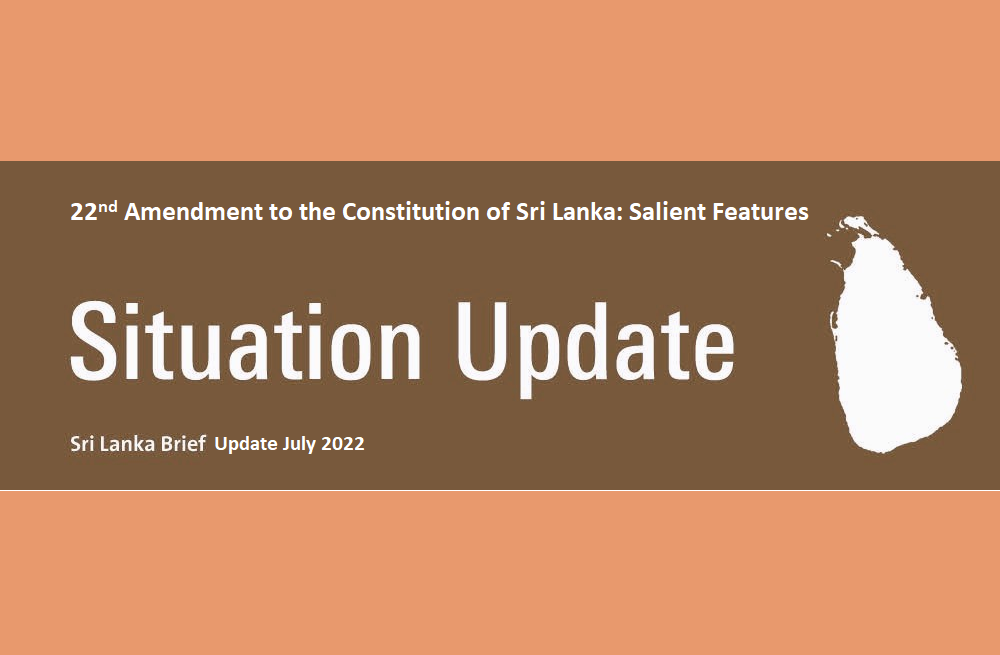Sri Lanka Brief Update July 2022
- The 22nd amendment to the constitution of Sri Lanka which was submitted by Minister of Justice Wijedasa Rajapaksa and approved by the cabinet was gazetted on 24th June 2022. Although the previous amendment to the constitution was the 20th this amendment is called 22nd because already draft 21st amendment to the constitution has been gazetted. It was submitted as private member motion by the secretary of the Opposition Samagi Jana Balawegaya, MP Ranjith Madduma Banadara.
- Two days after the anti-government violence engulfed the nation, on 11th May 2022 President Gotabhaya Rajapaksa said that he will empower the parliament, bringing back the 19th amendment [replacing the 20th Amendment] and he is ready to abolish the executive presidency once the country stabilises.
- 3. Although the 20th Amendment to the constitution, which empowered the President over the parliament was hailed as the path way to prosperity by Rajapaksa family led Sri Lanka Podujana Peramuna (SLPP) it in fact rolled back democratic reforms introduced by the 19 A in 2015 and returned to unfettered executive power institutionalised by the Eighteenth Amendment introduced in 2010.
- 4. The gazetted 22nd Amendment has negated the promise president Rajapaksa made in his address to the nation on 11th May 2022. It is not only 19th Amendment minus, but also it provides for the continuation of authoritative executive presidential rule.
- Except the establishment of the Constitutional Council all changes proposed under the 22nd Amendment in relation to executive powers of the presidency come in to force only after the current parliament comes to an end in August 2025 (as scheduled). Term of the President Gotabhaya Rajapaksa ends before that, in November 2024 (as scheduled).
5.1. Removal of the Prime Minster: Under 19A, the removal of the Prime Minister was a matter solely for Parliament. Under 22 A President can remove the Prime Minister if he is in the opinion that Prime Minister has lost the confidence of Parliament, and this would only apply during the present Parliament.
5.2 Under 19A, the President could have dissolved Parliament within the first four and a half years only if Parliament requested dissolution by a two-thirds majority. 20A changed this to provide that the President could dissolve Parliament during the first half of its term if Parliament so requested by a simple majority. 22A does not seek to change this.
5.3 Under 19A, the President should appoint Ministers and Deputy Ministers on the advice of the Prime Minister. 22A seeks to bring back the requirement of the Prime Minister’s advice, but this would not apply during the present Parliament.
- Under the 22 A, the President will continue to be able to appoint all Secretaries to Ministry on his own discretion. The Secretary to Ministry is the person who exercises supervision and control over the institutions that come under a Ministry, especially in relation to financial control.
- Under the 22 A, the Constitutional Council has been brought back replacing the parliamentary Council established under the 20 A. But under the new provisions the 22 A, government will have control of 7 of the 10 members of the Constitutional Council when the President & government are from the same political party.
- Under the 22 A, 3 eminent persons should be nominated to the Constitutional Council. Contrary to the 19 A, these 3 persons will be appointed by the Speaker in consultations with the Prime Minister and the Leader of the Opposition and approved by a parliamentary majority if there is no consensus. Smaller parties will not be consulted in this process.
- Allowing the majority in parliament to control the composition of the constitutional council will adversely affect the ability of the Constitutional Council to act as a check and balance on the exercise of Presidential powers.
- Thus the 22nd Amendment as presently constituted does not sufficiently guarantee the independence of the process of appointment of non-Parliamentary members of the Constitutional Council. The independence of the Constitutional Council is very important because it is the Constitutional Council which approves the key officers of the state including the judges of the apex courts, the Attorney General and Inspector General of Police.
- Appointment of members for the Right to Information Commission (pg12), Missing Persons Office (pg4) and Office for Reparations (pg3) too comes under the Constitutional Council and as provided in the relevant acts.
- Monetary Board of the Central Bank has not been brought within the purview of the Constitutional Council, although the Governor of the Central Bank is included.
(Sri Lanka Brief thanks authors and media for the above quoted opinions.)
